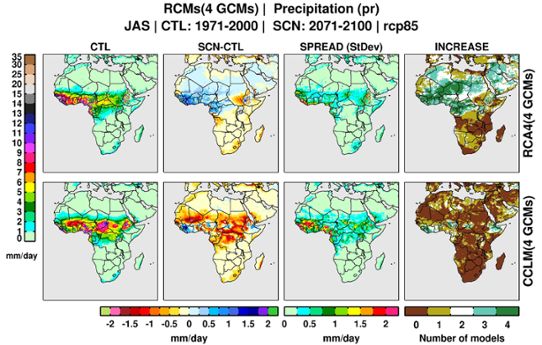Background
Information about possible future climate change under global warming is becoming an integral part of developing suitable adaptation and mitigation strategies at global, national, regional and local levels. The use of downscaling techniques (regional climate models and statistical methods) as a source of high-resolution regional climate information has been well established and recognised with a remarkable progress within the Coordinated Regional climate Downscaling Experiment (CORDEX). During the recent years a large number of downscaled climate change scenarios for different regions worldwide were generated and made openly available.
Focus
Even though a large volume of regional climate data is available, still there are many gaps in our understanding of regional climate; additionally data does not necessary mean information. Now the main focus is on how to translate this regional climate data to regional climate information relevant and usable for decision and policy making. To advance such translation it is necessary to fill the gaps in our understanding of regional climate and address scientific questions not fully explored at moment.
Research questions
- What is the contribution to regional climate from local (e.g., snow, soil moisture, soil moisture-precipitation feedback) and global (e.g. teleconnections) drivers in different regions?
- What is the source of contradicting messages across different climate data? What kind of local processes are involved in these contradicting messages?
- What level of uncertainties does bias adjustment (correction) introduce to regional climate information?
- How to provide an integral measure of uncertainty for the entire downscaling chain (global climate models / downscaling / bias adjustment / regional impact studies)?
- What is the spatial and temporal scale dependency of uncertainties in regional climate information?
- Can smaller subsets of climate simulations from a grand ensemble be representative and how to select such subsets?
Tools
To address these scientific challenges a number of new and novel approaches are being applied, namely:
- advanced statistical analysis in order to clarify contribution of large-scale and local processes to regional climate and the added value of downscaling
- new targeted downscaling experiments
- different bias adjustment methods
- different methodologies for selection of reduced ensembles of climate simulations.
All the above steps aim to provide ‘transformed’ scale-relevant climate information necessary for impact studies and are ongoing in close cooperation with international partners and with other groups at SMHI. Such activities are inline with the Global Framework for Climate Services (GFCS) coordinated by WMO and will help in establishing climate services infrastructure.
Recent publications
- Dosio, A. et al., 2019. What can we know about future precipitation in Africa?: Robustness, significance and added value of projections from a large ensemble of regional climate models. Climate Dynamics, 53 (9-10), 5833-5858.
- Tangang, F.et al., 2019. Projected future changes in mean precipitation over Thailand based on multi-model regional climate simulations of CORDEX Southeast Asia. International Journal of Climatology, 39 (14), 5413-5436.
- Tamoffo, A. et al, 2019. Process-oriented assessment of RCA4 regional climate model projections over the Congo Basin under 1.5. C and 2. C global warming levels: influence of regional moisture fluxes. Climate Dynamics, 53 (3-4), 1911-1935.
- Hendris, H. et al, 2019. Future changes in rainfall associated with ENSO, IOD and changes in the mean state over Eastern Africa. Climate Dynamics, 52 (3-4), 2029-2053.
- Nikulin, G. et al., 2018. The effects of 1.5 and 2 degrees of global warming on Africa in the CORDEX ensemble. Environmental Research Letters,13 (6), 065003.
- Kämäräinen, M. et al., 2018. Estimates of Present-Day and Future Climatologies of Freezing Rain in Europe Based on CORDEX Regional Climate Models. Journal of Geophysical Research – Atmospheres, 123 (23), 13291-13304.
- Maure, G., et al. 2018. The southern African climate under 1.5 degrees C and 2 degrees C of global warming as simulated by CORDEX regional climate models. Environmental Research Letters, 13 (6) , 065002.
- Kjellström, Erik et al., 2018. European climate change at global mean temperature increases of 1.5 and 2 degrees C above pre-industrial conditions as simulated by the EURO-CORDEX regional climate models. Earth System Dynamics, 9 (2), 459-478.
- Nikulin G. and 20 Co-Authors, 2018. Dynamical and statistical downscaling of a global seasonal hindcast in eastern Africa. Climate Services, 9, 72-85.
